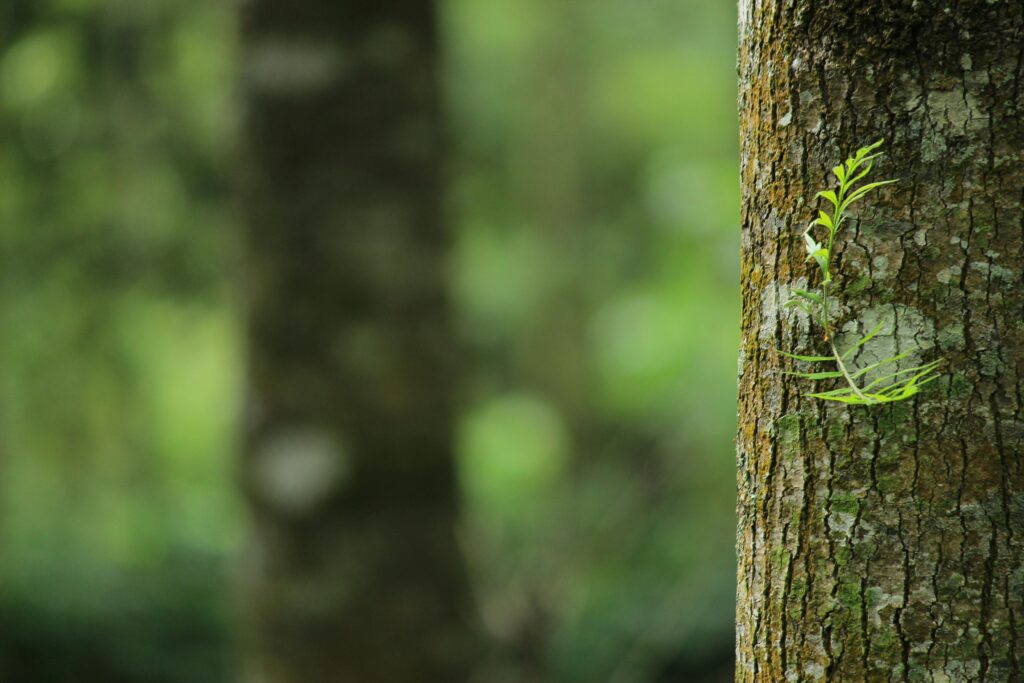As Mother’s Day approaches, we’re reminded of the power of care, connection, and nurturing – qualities we often associate with the women who’ve raised us. But these same qualities exist all around us, in the rhythms of the natural world. The Earth, too, has a quiet way of supporting and sustaining us through its food, its forests, and its stillness.
For centuries, people have turned to nature for healing. Whether through medicinal plants, nutrient-dense foods, or simply spending time outdoors, the natural world offers tools for resilience and balance. While modern wellness practices have only recently begun to fully appreciate nature’s role in health, “The Healing Power of Nature” (also known as Vis Medicatrix Naturae) has been a core principle of naturopathic medicine since it was founded in 1896. So what is nature’s healing power? Read on to find out!
Forest Bathing for Stress Reduction
Have you ever noticed that you feel calmer after a walk in the forest? This may be due to your exposure to phytoncides– potent chemicals released by trees that have been shown to reduce cortisol levels.
Originally developed in Japan in the 1980s, Shinrin-yoku otherwise known as “forest bathing” involves immersing oneself in the forest atmosphere through your senses – walking slowly, breathing deeply, and simply being present in nature. More recently, shinrin-yoku has gained scientific backing. One study found that forest bathing can enhance immune function by increasing natural killer (NK) cell activity, lowering blood pressure and heart rate, reducing stress hormones like cortisol, improving sleep, and restoring balance to the nervous system.
How to do it:
- Find a location surrounded by trees: While you can gain the benefits of being near trees anywhere, the results will be more significant if you are able to gain access to the deeper woods. Some of our favorite spots to visit if you live in Vancouver include Lynn Canyon Park, Pacific Spirit Regional Park, and Stanley Park.
- Aim to reduce your heart rate: While a run through the woods is a great way to support your cardiovascular health, Shinrin-yoku focuses on slowing down and channeling a meditative state. Consider sitting on a bench, going for a gentle walk, or practicing yoga or tai chi.
- Breathe: Many of the benefits of shinrin-yoku are attributable to the inhalation of phytoncides. Once you find a comfortable and safe space, focus your attention on the scents around you and on breathing deeply.
- Practice mindfulness or meditation: Try to slow down your mind and focus on what your senses are experiencing; What do you see? How does it smell? What can you hear? Bringing your attention to the present moment is a great way to practice mindfulness.

Mushrooms and the Immune System
Have you noticed the increase in mushroom-based health products? Whether it’s mushroom hot chocolate, mushroom snacks, or immune supplements, recent literature suggests immense benefits associated with consuming various fungi.
A large body of research suggests that certain mushroom species have promising applications in oncology, attributable in part to their abilities to modulate the immune system. Mushrooms have also demonstrated potent abilities to slow the growth of tumors, regulate tumor genes, and even boost the efficacy of chemotherapy in certain patients. Additionally, mushrooms are reported to have antimicrobial, anti-inflammatory, cardiovascular-protective, anti-diabetic, and liver protecting properties. Scientists believe that the immune modulation provided by mushrooms is attributable to bioactive compounds like beta-glucans, which interact with immune cells.
While each mushroom contains a unique set of properties and a unique dosage required to elicit its effects, increasing your consumption of mushrooms in cooking can demonstrate sizable health benefits. For example, common culinary mushrooms like button and shiitake boost protein, dietary fibre, and essential vitamins and minerals like B vitamins, vitamin D2, selenium, and potassium. Furthermore, their various bioactive compounds contribute to antioxidant properties, immune support, anti-inflammatory effects, and cardiovascular benefits.

Water as a Healing Element
Water has long been recognized as a symbol of renewal, and its therapeutic potential goes far beyond hydration. Whether it’s the calming rhythm of ocean waves, the invigorating feel of a cold plunge, or the deep relaxation of a warm bath, water plays a vital role in regulating our nervous system and supporting our emotional wellbeing. Hydrotherapy, a practice used for centuries, uses water in all its forms (steam, ice, liquid) to stimulate circulation, ease pain, and reduce stress. Even the simple act of spending time near water – what researchers call “blue spaces” – has been linked to lower anxiety and increased mental clarity. Whether you’re soaking in a hot spring or walking along a shoreline, water invites us to slow down, soften, and restore.
Not sure where to start when it comes to hydrotherapy? Consider trying some simple practices lik alternating hot and cold showers, soaking your feet in warm water with Epsom salts, or ending your shower with a quick cold rinse to invigorate the body. Vancouver also offers numerous hydrotherapy spas that provide a mix of Saunas and cold plunges if you’re looking for a more curated experience. Not a fan of immersive hydrotherapy? You can reap stress reduction benefits simply by sitting near the ocean. Find a comfortable place along the shoreline and focus your attention on the smells, sounds, and sights around you for a restorative moment.

Want to Learn More About the Healing Power of Nature?
Did this post leave you wanting more? Here are some book recommendations that dive deeper into the healing power of nature:
- Braiding Sweetgrass by Robin Wall Kimmerer: A beautiful blend of Indigenous wisdom, botany, and storytelling, this book explores our reciprocal relationship with the land. It’s deeply grounding and poetic, perfect for anyone interested in nature’s emotional and spiritual healing power.
- The Nature Fix: Why Nature Makes Us Happier, Healthier, and More Creative by Florence Williams: Drawing on cutting-edge science from around the world, this book delves into how time in nature improves our mood, immune system, and brain function.
- How to Change Your Mind by Michael Pollan: Though more focused on psychedelics, this book reconnects us with ancient healing practices rooted in fungi and plants—and challenges how we think about consciousness, nature, and medicine.
- The Secret Life of Trees by Peter Wohlleben: An accessible and fascinating look into how trees communicate, support one another, and affect their ecosystems—reminding us that forests are alive in ways we’re just beginning to understand.

Disclaimer: The content provided on this blog is intended for informational purposes only and should not be construed as medical advice. While we strive to present accurate and up-to-date information, the field of naturopathic medicine is continually evolving, and individual health circumstances vary. Therefore, the information herein may not apply to your specific health situation.
Please be aware that engaging with this blog does not establish a doctor-patient relationship. For personalized medical advice, diagnoses, or treatment plans, we recommend scheduling a consultation with a qualified naturopathic physician or other licensed healthcare provider.
In the event of a medical emergency, contact emergency services immediately.
References:
Gunawardena, D., Bennett, L., Shanmugam, K., et al. (2014). Anti-inflammatory effects of five commercially available mushroom species determined in lipopolysaccharide and interferon-γ activated murine macrophages. Food Chemistry, 148, 92–96. https://doi.org/10.1016/j.foodchem.2013.10.015
Hamza, A., Mylarapu, A., Krishna, K. V., & Kumar, D. S. (2024). An insight into the nutritional and medicinal value of edible mushrooms: A natural treasury for human health. Journal of Biotechnology. Advance online publication. https://doi.org/10.1016/j.jbiotec.2023.12.014
Kumar, K., Mehra, R., Guiné, R. P. F., et al. (2021). Edible mushrooms: A comprehensive review on bioactive compounds with health benefits and processing aspects. Foods, 10(12), 2996. https://doi.org/10.3390/foods10122996
Li, Q. (2022). Effects of forest environment (Shinrin-yoku/forest bathing) on health promotion and disease prevention: The establishment of “forest medicine.” Environmental Health and Preventive Medicine, 27, 43. https://doi.org/10.1265/ehpm.22-00160

